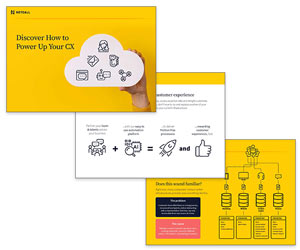John Clarke at Netcall outlines how the integration of automation, AI, customer experience strategies, and data-driven solutions can revolutionise elective care, with a deep dive into how these innovations are shaping the future of healthcare.
The recent Elective Care Reform plan by the Department of Health and Social Care sets out a bold vision for the future of elective care, aiming to reduce waiting times, enhance patient experience and improve overall healthcare delivery.
As noted in the report, technology will play a pivotal role in achieving these ambitious goals. We can go to parts of the NHS and see the component parts in action.
The challenge is how to bring this together, affordably and everywhere? This would enable excellent, technologically enabled access to what has always been high-quality clinical care.
1. Automation: Streamlining Processes for Efficiency
Automation is a game-changer in healthcare (always has been and always will be) particularly in managing elective care pathways.
By automating routine administrative tasks, such as appointment scheduling, patient follow-ups and referral management, healthcare providers can significantly reduce the burden on staff and minimise errors. This can remove the lottery of who we speak to when we eventually get through to a person.
An interesting outcome to the shift to automated processes is the amount of time that is freed. This enables teams to provide a timely and potentially better service to the more complex cases, or for those patients who can’t engage digitally.
2. AI: Enhancing Decision-Making and Personalisation
Artificial Intelligence (AI) has the potential to revolutionise patient care by providing data-driven insights and personalised treatment plans.
Through work with NHS Trusts, we’ve seen how AI algorithms can analyse vast amounts of patient data to predict health outcomes, identify high-risk patients and recommend appropriate interventions.
For instance, AI can help in triaging patients to ensure that those with urgent needs are prioritised, and elective procedures are scheduled efficiently.
Additionally, looking at the patient experience, we’ve seen how our AI-powered chatbots, webchat and speech-bots can provide patients with instant responses to their queries. This can be done, in their own language where needed, improving accessibility and satisfaction.
We can see how these technologies are being leveraged to increase customer satisfaction and overall experience in multiple industries.
The challenge from this plan is how to bring the technology, and utilise the learning from other domains, to healthcare.
3. Customer Experience (CX): Putting Patients at the Heart of Care
We mustn’t forget that technology alone will not achieve the goals. It is the patient-centric approach that is crucial for improving the overall healthcare experience.
However, we have seen that, by leveraging advanced contact centre solutions, healthcare providers can offer seamless and personalised interactions.
Patients should have the ability to book appointments, access their medical records, and receive updates on their care journey through user-friendly digital platforms like Patient Engagement Portals and the NHS App.
Although, when it comes to talking to a person, it’s still highly likely that they have to utilise a plethora of confusing and contradictory internal systems, which aren’t optimised for tracking the patient journey.
Going forward, systems such as our patient management system (PRM) alongside our Liberty Converse contact centre solution will allow for that seamless 360-degree view of the patient journey and relevant information. This allows tasks to be completed or automated from a single screen.
Enhancing CX involves not only providing timely and accurate information but also ensuring that patients feel supported and empowered throughout their healthcare journey.
The need for an omnichannel approach, where users receive the same high-quality care irrespective of their engagement channel, is imperative.
We need to remember, as we stand today, digital engagement is a choice not an obligation. Our processes need to support this.
4. Contact Centre Solutions: Enhancing Communication and Support
Modern contact centre solutions equipped with AI and automation can transform how healthcare providers interact with patients.
These solutions can handle a high volume of enquiries, provide real-time support and ensure that patients receive consistent and accurate information.
This can be taken to the next level by integrating the contact centre with electronic health records (EHRs), enabling healthcare providers to offer personalised support, track patient interactions and ensure continuity of care.
There is a level of management insight and action that is commonplace in corporate boardrooms and is acted upon. In healthcare, this is and can be gleaned from sentiment analysis and satisfaction scores from customer contacts. Presently, this is at best reduced to the FFT and at worst ignored.
By appointing an executive lead, who has access and accountability for patient experience, they will need to identify performance gaps between high and low performers.
This will enable them to track and eliminate unwanted variations in practice as well as promoting and sharing improvements/best practice.
5. Data Integration and Analytics: Driving Continuous Improvement
The integration of data across various healthcare systems is essential for providing a holistic view of patient care. Advanced analytics can help healthcare providers to identify trends, monitor performance and make informed decisions.
The ability for organisations, working together, to have a 360 view of the patient, any interactions, communications, preferences and accessibility issues, is a base minimum requirement of a transformed system.
By leveraging data from electronic patient records, diagnostic tools and patient feedback, healthcare providers can continuously improve their services and address any gaps in care delivery.
Looking Ahead
- The future of elective care lies in the seamless integration of technology, automation and a patient-centric approach that brings together all the people and organisations responsible for the care pathways
- By harnessing the power of AI, automation and advanced contact centre solutions, we can create a healthcare system that is efficient, responsive, and truly centred around the needs of patients
- As we move towards this vision, it’s imperative that healthcare providers, technology experts and policymakers work collaboratively to ensure that these innovations are implemented effectively and equitably.
Together, we can transform elective care and build a sustainable healthcare system that meets the needs of all patients, now and in the future.
This blog post has been re-published by kind permission of Netcall – View the Original Article
For more information about Netcall - visit the Netcall Website
Call Centre Helper is not responsible for the content of these guest blog posts. The opinions expressed in this article are those of the author, and do not necessarily reflect those of Call Centre Helper.
Author: Netcall
Reviewed by: Jo Robinson
Published On: 27th Feb 2025
Read more about - Guest Blogs, Netcall






 Netcall is trusted by organisations worldwide, with 9 out of 10 customers ready to recommend us. With Liberty Converse CX, you can streamline operations, enhance customer engagement, and achieve real, measurable results.
Netcall is trusted by organisations worldwide, with 9 out of 10 customers ready to recommend us. With Liberty Converse CX, you can streamline operations, enhance customer engagement, and achieve real, measurable results. 









